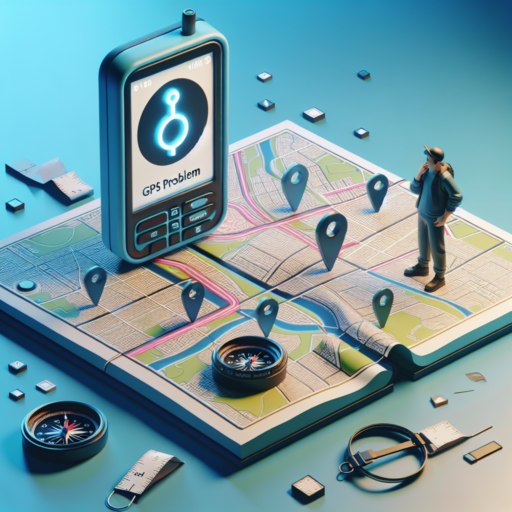Understanding Common GPS Problems
Global Positioning Systems (GPS) have become indispensable in the modern world, guiding millions to their destinations every day. However, users often encounter various issues that can impede their navigation experience. By grasping the nature of these common GPS problems, you can troubleshoot more effectively and understand why these issues occur.
Signal Loss in Urban Canyons
In densely built-up areas, the phenomenon known as the «urban canyon» can significantly disrupt GPS signals. Skyscrapers and tall buildings act as barriers that either block or reflect GPS signals, making it challenging for your device to maintain a consistent connection. This interference can lead to inaccurate location tracking or the loss of signal altogether. The urban canyon effect exemplifies how modern infrastructure can inadvertently affect technology designed to make life easier.
Inaccurate GPS Data Due to Multipath Errors
Multipath errors occur when GPS signals bounce off surfaces, such as buildings or large bodies of water, before they reach the receiver. This can cause significant inaccuracies in GPS data, as the device might interpret the signal as coming from multiple locations. Understanding and mitigating multipath errors are crucial for improving the accuracy of GPS-based navigation, especially in urban environments.
These common GPS problems highlight the limitations and challenges of relying solely on satellite navigation. Awareness and a basic understanding of these issues can enhance your navigation experience and lead to less frustration on the road.
No se han encontrado productos.
Top 5 Reasons Your GPS Isn’t Working Properly
When your GPS starts acting up, it can lead to frustration, delays, and sometimes even safety concerns. Understanding the top reasons behind these malfunctions can help you troubleshoot effectively. Here are the most common culprits:
1. Weak Signal Strength
One of the primary reasons a GPS may not work correctly is weak signal strength. This can occur if you’re in a heavily wooded area, between tall buildings, or in a deep valley. Such environments can block or interfere with the signal from satellites, causing inaccuracies or loss of service.
2. Outdated GPS Software
Like any technology, GPS systems require updates to function optimally. Outdated software can lead to problems with accuracy, including incorrect directions or an inability to find a location. Ensuring your GPS is updated regularly is essential for reliable performance.
3. Battery Issues
A low or faulty battery is another common reason for GPS dysfunction. Insufficient power can prevent the GPS from maintaining a stable connection to satellites. If your device has been having power issues, it’s worth checking the battery or power supply.
Step-by-Step Guide to Fixing GPS Signal Issues
Navigating through the maze of GPS signal issues can be frustrating, especially when you’re depending on it for critical directions or data collection. Fortunately, addressing and solving GPS problems doesn’t have to be a daunting task. This guide walks you through a straightforward, systematic approach to diagnose and fix GPS signal issues, ensuring you’re back on the right path with minimal downtime.
Check Your Device’s Location Settings
Firstly, verify that your device’s location settings are correctly configured to allow GPS tracking. For most smartphones, this involves going into your settings app and ensuring that location services are enabled for the specific app you’re using.
Ensure Clear Sky Visibility
GPS signals are significantly stronger and more accurate when you have a clear line of sight to the sky. Tall buildings, heavy foliage, or being indoors can obstruct these signals. If you’re experiencing GPS inaccuracies, try moving to a location with fewer obstructions between your device and the sky.
Turn Off and Restart Your Device
Sometimes, the simplest solution is the most effective. Turning off your device and then restarting it can refresh your connection to GPS satellites. This step can clear up minor software glitches that may be disrupting your GPS signal.
How Weather and Environment Affect Your GPS Accuracy
While it might seem like GPS technology is solely dependent on satellites and signals far above our heads, various terrestrial factors significantly impact its accuracy. Understanding how weather and the environment play a crucial role in the preciseness of GPS data is essential for users relying on this technology for navigation, tracking, and other critical applications.
Impact of Atmospheric Conditions
First and foremost, the atmosphere is a major player in GPS signal degradation. Heavy weather conditions, such as thick clouds, rain, or even solar flares, can disturb the signals traveling between satellites and GPS receivers. This interference can cause delays or inaccuracies in the data you receive. It’s not uncommon for GPS devices to show slight discrepancies during stormy or extreme weather conditions. Consequently, advanced forecasting and correction algorithms are implemented in GPS technologies to mitigate these effects as much as possible.
Environmental Barriers
Aside from atmospheric conditions, the physical environment can also hinder GPS accuracy. Urban canyons created by tall buildings, dense forests, deep valleys, or mountain regions can obstruct the line of sight between satellites and GPS receivers. These obstructions lead to a phenomenon known as «multipath errors,» where GPS signals bounce off surfaces before reaching the receiver, causing errors in the position data. Urban settings, in particular, are known for their potential to reduce GPS accuracy due to tall structures and heavy use of electronic devices that can interfere with signals.
The interaction between weather, the environment, and GPS technology is a delicate balance. Understanding these factors emphasizes the importance of developing more robust systems capable of reducing inaccuracies and ensuring that GPS remains a reliable tool for global navigation and tracking. Manufacturers continuously innovate to counter these naturally occurring disruptions, improving the resilience of GPS technology against the unpredictable elements of weather and the environment.
DIY Troubleshooting Tips for Quick GPS Fixes
Experiencing problems with your GPS can be frustrating, especially when you’re relying on it to guide you through unfamiliar territory. Before you consider professional repairs or replacements, there are several DIY troubleshooting tips you can try out to achieve quick GPS fixes. These methods are easy to follow and can often restore your device’s functionality in no time.
Check Your Device’s GPS Settings
First and foremost, verify that your GPS settings are configured correctly. In some cases, the GPS might be turned off or obstructed by other settings. Navigate through your device’s settings menu to ensure that the GPS or location services are enabled. Also, set the mode to «High accuracy» to allow the use of GPS, Wi-Fi, and mobile networks to pinpoint your location precisely.
Update Your Device’s Software
Software updates often come with improvements and bug fixes that can resolve persistent GPS issues. Check if your device has any pending updates and install them. For smartphones, go to your «Settings» app, select «System», then tap on «System Update» to see if any updates are available. Keeping your device’s software up to date is crucial for optimal GPS performance.
Expert Advice: Preventing Future GPS Problems
Experiencing difficulties with GPS technology can disrupt your daily routines and travel plans, leading to frustration and lost time. However, with the proper knowledge and precautions, it’s possible to minimize or even prevent future GPS-related issues. Below, we delve into expert recommendations aimed at enhancing your GPS experience and ensuring smooth, uninterrupted navigation.
Regularly Update Your GPS System
One of the key steps in preventing GPS problems is to regularly update your system’s software. Manufacturers often release updates to improve functionality, add new features, and correct any errors that may interfere with the accuracy of your device. Ensuring your GPS device or application is up-to-date can significantly reduce the chances of encountering issues.
Optimize Your Device Settings for Accuracy
Adjusting your GPS device’s settings for better accuracy is crucial. Experts suggest enabling high-accuracy modes, if available, which allow your device to use a combination of GPS, Wi-Fi, Bluetooth, and cellular networks to pinpoint your location more precisely. Additionally, clearing the cache in your GPS application can resolve errors and improve performance. Remember, ensuring a clear view of the sky enhances GPS signal strength, so avoid using devices in locations where signal reception might be obstructed, such as between tall buildings or in heavily wooded areas.
Maintaining and enhancing your GPS system’s performance is an ongoing process that requires attention and effort. By implementing these expert suggestions, you can look forward to more reliable navigation that keeps pace with your adventures and daily needs, without the setbacks of common GPS problems.
The Role of Software Updates in Solving GPS Issues
Understanding the importance of software updates can often be the key to solving persistent GPS issues. Manufacturers regularly release software updates not just for enhancements but for fixing bugs and glitches that users face. These updates can significantly improve the accuracy, reliability, and speed of GPS systems. Whether it’s for navigation, fitness tracking, or any other GPS-reliant application, keeping your software up-to-date can transform your experience.
Software updates often include improvements to the algorithms used by GPS systems. This advancement allows for better computation of your geographic location, leading to more precise positioning. Moreover, updates can optimize power consumption, which is crucial for devices like smartphones and wearable tech, ensuring that GPS functions do not excessively drain the battery. Users experiencing issues with GPS lag or inaccuracy might find that a simple software update resolves these problems efficiently.
Another critical aspect covered by updates is the enhancement of compatibility between the GPS system and various satellites. Over time, the global network of satellites evolves, and software updates ensure that your device can communicate effectively with this ever-changing setup. This is particularly important for users who rely on GPS for critical tasks, as it ensures that the data received is both current and accurate. Ignoring software updates can leave your device lagging behind, both in functionality and security, making it more susceptible to GPS-related issues.
When to Seek Professional Help for Your GPS Problem
Identifying the right moment to seek professional assistance for a GPS issue can be crucial for ensuring the functionality and reliability of your navigation system. While some problems may be resolved with simple fixes, others necessitate the expertise of a professional. Knowing the signs that indicate the need for professional help can save you from further inconvenience and potential hazards.
Consistent Signal Loss or Inaccuracy
One clear sign that it’s time to consult with a professional is if you experience consistent signal loss or inaccuracy in your GPS. This could manifest as your device struggling to establish a connection or frequently dropping the signal in areas where you previously had strong coverage. It might also show as persistent inaccuracies in location tracking, leading to wrong directions or misestimating distances. Such issues often stem from deep-seated software or hardware malfunctions that require specialized diagnostics and repair.
Physical Damage to the GPS Device
Physical damage to your GPS device, such as a cracked screen, water damage, or connectivity issues due to damaged ports, clearly indicates the need for professional repair. Small cracks can sometimes obscure the display or make it unresponsive, while water damage can cause internal components to malfunction. In these cases, attempting DIY repairs without the proper tools or knowledge can further harm the device, emphasizing the importance of seeking professional help.
In conclusion, recognizing when to seek professional help for your GPS problem is essential for maintaining its longevity and functionality. Consulting with a professional at the right time can prevent minor issues from escalating into significant problems, ensuring that your navigation system remains reliable when you need it most.




